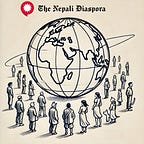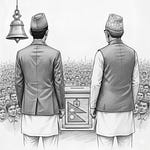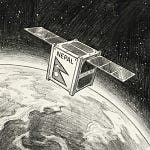Share the love! Help others that care about Nepal stay up to date the easy way. If you like this issue, share it with a friend who follows Nepal and hit Subscribe for your weekly dose of curated, can’t-miss updates.
A historic corruption storm swept across Nepal this week — and it wasn’t just the weather acting up. From telecoms to city hall to top banks, high-profile scandals are making it harder for leaders to look the other way. Amid the noise, Nepal’s economy presses on, and fans in Scotland remind us that pride in the homeland isn’t always tied to headlines.
Economy & Development 💸
Nepal’s formal economy was rocked this week by a wave of corruption scandals, exposing deep-rooted dysfunction across banking, telecoms, and municipal governance. A shareholder complaint alleges that Rs 20.4 billion has vanished from Nepal Bank Limited, now with the CIAA, according to Republica. The complaint claims executives inflated SME loan figures with fake borrowers. Adding to the scandal, the bank’s former chairman was charged with taking a Rs 1.9 million bribe to fast-track a Rs 1.75 billion hotel loan, involving an Indian middleman, also reported by Republica.
Nepal Telecom has also been pulled into the corruption spotlight, with the CIAA charging 18 individuals, including its former and current managing directors, over alleged billing and procurement fraud totaling Rs 334 million, as detailed by THT. The commission accuses them of colluding with supplier firms through a rigged billing system contract, continuing a troubling trend in state-owned enterprises.
Kathmandu Metropolitan City faced twin corruption cases: former city engineer Ram Babu Koiri was charged with illegally accumulating over Rs 45 million, according to Nepal News, while ex-chief administrative officer Pradeep Pariyar and six others are alleged to have rigged a sewer contract, costing the city Rs 43 million, reported by Setopati. These incidents further illustrate how financial malfeasance at the municipal level is undermining public trust.
A historic moment unfolded this week as the CIAA filed a landmark corruption case against former Prime Minister Madhav Kumar Nepal, marking the first time a former head of government has faced charges. He and 92 others are accused of facilitating Cabinet approvals that let Patanjali Yogpeeth Nepal purchase and later flip land at inflated prices, resulting in losses of around Rs 185.85 million, according to Reuters. Nepal has denied the allegations, calling them politically motivated, particularly by PM Oli — but regardless, this prosecution signals a shift toward higher-level accountability.
In yet another financial anomaly, the Revenue Investigation Office in Butwal has seized approximately Rs 35 million in illegal currency this fiscal year—mainly Indian rupees, US dollars, and UAE dirhams—highlighting the scale of cross-border illicit flows, according to Republica. Seizures like this underscore the layers of systemic corruption still at play beyond headline thefts.
Beyond these corruption revelations, Nepal’s structural economic challenges remain stark. The Birgunj Customs Office disclosed that nearly half its revenue—Rs 64.5 billion—derived solely from petroleum imports, underlining the country’s limited tax base, as reported by Republica. The Dairy Development Corporation (DDC) is struggling to offload 600 metric tons of surplus dairy stock and is behind on payments totaling over Rs 1 billion, also from Republica. A brighter sign arrives with lawmakers advancing a new Industrial Property Rights Bill, aimed at tackling rampant brand piracy to help boost investor confidence, according to KTM Post.
Politics & Governance 🪧
The fallout from Nepal’s deepening corruption crisis spilled further into politics this week, as the visit visa scandal shook Parliament and put Home Minister Ramesh Lekhak on the defensive. Lawmakers from the CPN (Maoist Centre) called for Lekhak’s resignation on moral grounds, arguing that an impartial investigation would be impossible while he remains in office, according to TRN Online. Parliament sessions have remained deadlocked for over two weeks, with the Rastriya Swatantra Party (RSP) continuing to obstruct proceedings and demanding an independent probe into alleged human trafficking and organised crime networks tied to the immigration system, as reported by KTM Post.
Lekhak has rejected the accusations, calling them a politically motivated smear campaign and asserting his full willingness to cooperate with investigators, according to KTM Post. In a bid to move forward, the Nepali Congress, CPN-UML, and Maoist Centre reached a two-point agreement to support the CIAA’s investigation and initiate immigration system reforms. Yet the RSP remains unconvinced, continuing its protest and demanding a formal parliamentary committee, Republica reports. The impasse reflects deeper rifts within the coalition and growing mistrust in the government’s ability to self-correct.
Adding to the international dimension of Nepal’s governance troubles, the European Union placed Nepal on its high-risk money laundering list, citing ongoing weaknesses in enforcement and monitoring. The move, aligned with the FATF’s earlier grey-listing, may complicate cross-border financial transactions and investor confidence, as reported by Republica. Domestically, the CIAA arrested Madhesh Province lawmaker Saroj Kumar Singh for allegedly embezzling development funds via consumer committees, KTM Post reports. Meanwhile, CPN (Maoist Centre) leader Narayan Kaji Shrestha condemned the arrest warrant issued against journalist Dil Bhusan Pathak, calling it an attack on press freedom and a blow to democratic norms, according to Republica.
Prime Minister KP Sharma Oli’s government, now 11 months in, continues to face criticism for underwhelming performance and internal friction, with even coalition leaders expressing discontent over stalled reforms and governance drift, as detailed by Republica. On a modestly positive note, the Health Ministry issued a directive requiring government pharmacies to stock affordable organ transplant supplies, aiming to prevent patient exploitation, as reported by TRN Online. And while the headlines have been dominated by graft charges and dysfunction, this past week may also mark a critical shift toward accountability: a former prime minister has been charged, lawmakers have been arrested, and key institutions are finally being forced to reckon with long-standing impunity. If pursued with fairness and transparency, this could be a moment where Nepal begins to turn a corner.
Social & Cultural ⭐
Nepal’s annual Pride Parade is being held this weekend in Kathmandu—marking the country’s sixth consecutive year of celebrating LGBTQIA+ identity and rights. Organised by Queer Youth Group and allied collectives, the event continues to grow in visibility and significance, as noted by Wikipedia.
Across the hills of Rukum and Rolpa, communities have been immersed in Bhume Naach, the Kham Magar people’s sacred Earth festival. From mid-May to mid-June, villagers sing, drum, and dance around fire altars to honour ancestral spirits and the land—a vibrant tradition of ecological and spiritual reverence, as described in Wikipedia. Meanwhile, monsoon rains have now become active across five provinces, bringing much-needed relief to farmers after a slow start, according to Radio Nepal.
And in sports, Nepal’s men’s national football team is gearing up for the next round of the FIFA World Cup 2026 qualifiers, with an away match against the UAE in Dubai set for November 16, followed by a home fixture against Yemen in Kathmandu on November 21, as reported by Nepal News. While results remain to be seen, the fixtures are a reminder of Nepal’s growing ambitions on the global sporting stage.
Diaspora & Globalization 🌏
Fresh warnings of monopoly and exploitation are sounding across the Nepal–Malaysia migration corridor. As detailed by the KTM Post, new efforts to create a syndicate controlling recruitment agencies could mirror the abusive Bangladesh–Malaysia model, where thousands were trafficked into debt and forced labour. Although Nepal's recruitment costs have historically been lower, a total syndicate could lead to higher fees, reduced transparency, and lost business for smaller agencies—harming both workers and the broader remittance-driven economy. Critics argue it would not only undercut hard-earned progress toward ethical hiring but also strain Nepal’s diplomatic ties and constitutional commitments to free enterprise.
Meanwhile, tensions are escalating in the Middle East, impacting the Nepali diaspora. After Israel’s wave of strikes on Iran, major carriers like Emirates and Qatar Airways suspended flights across the region. According to TRN, UAE airports warned of delays as airspace closures spread across Iraq, Jordan, and Syria, while Jordan’s military reported drone interceptions. While this is a geopolitical flashpoint, it directly affects thousands of Nepalis transiting through the Gulf or working in affected countries—many of whom now face uncertainty around travel, safety, and remittance flows.
Yet even amidst these tensions, diaspora pride lit up the cricket grounds of Scotland. During Nepal’s ICC League 2 series, the national team found unexpected home advantage thanks to hundreds of Nepali fans who turned Dundee’s modest stadium into a festival of flags, conch shells, and collective joy. From an 89-year-old Arbroath local to late-night drivers from London, the crowd’s energy was so intense it sparked a pitch invasion and stadium rule changes. As KTM Post reports, for Nepalis abroad, cricket is becoming more than sport—it’s a powerful anchor to identity and home.
Did you know ❓
Nepal’s only natural UNESCO World Heritage Site, Chitwan National Park, isn’t just home to rhinos and tigers — it hosts over 540 bird species, making it a global birdwatching hotspot. From the endangered Bengal florican to the majestic white-rumped vulture, this subtropical jungle is a feathered treasure trove hidden in plain sight.
Let’s connect
Enjoying this issue? 📩 Share it with a friend & let’s keep Nepalis worldwide in the loop! Got thoughts? Hit reply—we’re all ears! Or let us know what you think via our Feedback form or follow us on Facebook | LinkedIn
P.S. Got a story or issue you'd like us to cover next week? Drop us a reply — we're building this space together.
About Nepali Diaspora Digest:
The Nepali Diaspora Digest connects the global Nepali community with curated news, insights, and stories that matter most. Join us as we celebrate and explore the diverse voices and achievements of Nepalis worldwide.
Partner shout out
belayat.uk: helping Nepalis connect in the UK on jobs, housing, events and finding local Nepali owned businesses












